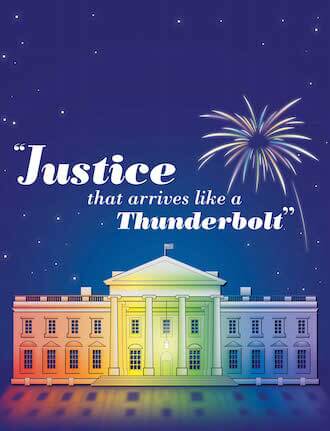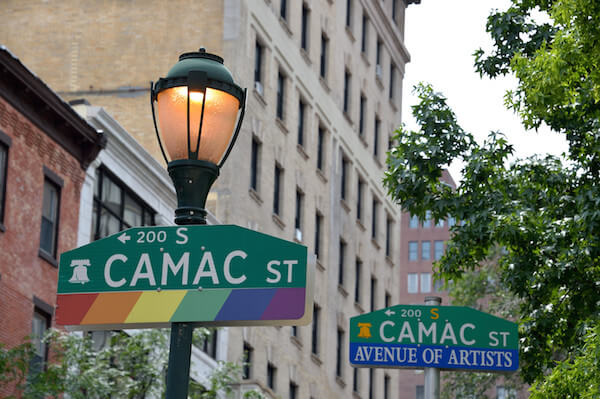Marriage plaintiffs Lynn and Fredia Hurdle, in front of an iconic Pennsylvania site, the Frank Lloyd Wright-designed Fallingwater home in Mill Run. | WHYMARRIAGEMATTERSPA.ORG
A Republican appointed to the federal bench by President George W. Bush in 2002 has struck down Pennsylvania’s statutory ban on same-sex marriage and its recognition.
US District Judge John E. Jones III, in a May 20 ruling, found that the ban violates both the Due Process and Equal Protection Clauses of the US Constitution’s 14th Amendment.
Jones made no mention of any stay, though it is likely that Republican Governor Tom Corbett will seek one, first from the judge, and if that fails, from the Philadelphia-based Third Circuit Court of Appeals. The state has 30 days to appeal Jones’ order.
US district judge orders state to allow same-sex marriages, recognize them from other jurisdictions
The American Civil Liberties Union filed this lawsuit last July on behalf of what Jones described as “eleven courageous lesbian and gay couples, one widow, and two teenage children of one of the aforesaid couples.” Some of the couples are seeking marriage licenses, others want recognition of their out-of-state marriages, the teenagers complained about the deprivations they suffer from their parents not being married, and the widow, who married her late partner out of state, pointed to the harms she suffers from not being recognized as a surviving spouse.
One defense raised by the state was that the plaintiffs failed to show any injury for the court to redress, a nonsensical position that Jones dispatched efficiently. He found that the “stigmatizing harms” imposed by the statutes, which were passed in 1996 in response to progress in a marriage equality lawsuit in Hawaii, were “cognizable” as a matter of law, and, additionally, that “plaintiffs suffer a multitude of daily harms, for instance, in the areas of child-rearing, healthcare, taxation, and end-of-life planning.”
He also noted the discussion by Supreme Court Justice Anthony Kennedy, in his majority opinion in the Defense of Marriage Act case last year, about the harms suffered by legally married couples denied federal recognition.
The state’s other main defense was that this case is precluded by the Supreme Court’s 1972 ruling in Baker v. Nelson, in which the high court declined –– for lack of a “substantial federal question” –– to hear an appeal of a Minnesota Supreme Court decision denying equal marriage rights. All of the recent marriage equality decisions from US district courts have rejected this argument –– pointing to the significant developments in American constitutional law since 1972, not least last year’s Supreme Court ruling striking down DOMA –– and concluded that exclusion of same-sex couples from marriage now presents a very substantial federal question.
Jones found the Pennsylvania statutes unconstitutional on two separate theories –– due process and equal protection.
The due process conclusion rests on Supreme Court decisions finding that the “right to marry” is a fundamental right, guaranteed to each individual. Jones rejected the state’s argument that because “the United States Supreme Court has never recognized that the fundamental right to marry includes the right to marry a person of one’s choice,” the state’s marriage laws did not violate the plaintiffs’ due process rights.
After briefly summarizing important Supreme Court marriage decisions, Jones wrote, “This Court is not only moved by the logic that the fundamental right to marry is a personal right to be exercised by the individual, but also rejects Defendants’ contention that concepts of history and tradition dictate that same-sex marriage is excluded from the fundamental right to marry. The right Plaintiffs seek to exercise is not a new right,” he continued, “but is rather a right that these individuals have always been guaranteed by the United States Constitution.”
He concluded this right encompasses both the right to marry and the right to remain married after crossing a state line.
Turning to equal protection, Jones noted that one branch of equal protection jurisprudence would apply strict scrutiny –– imposing the most demanding form of judicial review –– to any law that discriminates regarding a fundamental right. Nobody, he pointed out, contends that same-sex marriage bans would survive that standard.
Setting that issue aside, however, the judge analyzed whether discrimination based on sexual orientation requires heightened scrutiny, a standard of review used, for example, in cases of sex discrimination. The Third Circuit Court of Appeals has never ruled on the question, and neither has the Supreme Court, at least directly.
Jones noted that several of the other courts that have issued marriage equality rulings, in addition to the Ninth Circuit in a recent unrelated jury selection case, have held that heightened scrutiny is appropriate for sexual orientation claims. He also found that a review of the Supreme Court’s gay rights decisions suggests that it has been applying a more demanding standard of judicial review than the traditional deferential rational basis test, under which a law in presumed constitutional unless plaintiffs can show the state has no legitimate rational grounds for it.
In the end, Jones concluded that heightened scrutiny was the appropriate level of review.
Then, presuming the ban to be unconstitutional, he considered whether there was a countervailing “important governmental objective” to support Pennsylvania’s statute. Given that the state’s arguments sought to satisfy a more lenient standard of review, they fell well short of satisfactory for Jones.
Analyzing the state’s asssertions, the judge identified “promotion of procreation, child-rearing and the well-being of children” and “tradition” as the only interests Pennsylvania was putting forward.
“Significantly,” he wrote, “Defendants claim only that the objectives are ‘legitimate,’ advancing no argument that the interests are ‘important’ state interests as required to withstand heightened scrutiny. Also, Defendants do not explain the relationship between the classification and the governmental objectives served; much less do they provide an exceedingly persuasive justification. In essence, Defendants argue within the framework of deferential review and go no further. Indeed, it is unsurprising that Defendants muster no argument engaging the strictures of heightened scrutiny, as we, too, are unable to fathom an ingenuous defense saving the Marriage Laws from being invalidated under this more-searching standard.”
Like the other trial judges ruling in marriage equality cases over the past several months, Jones rose to an eloquent conclusion.
“The issue we resolve today is a divisive one,” he wrote. “Some of our citizens are made deeply uncomfortable by the notion of same-sex marriage. However, that same-sex marriage causes discomfort in some does not makes its prohibition constitutional. Nor can past tradition trump the bedrock constitutional guarantees of due process and equal protection. Were that not so, ours would still be a racially segregated nation according to the now rightfully discarded doctrine of ‘separate but equal.’”
Citing the Supreme Court’s key ruling against racial segregation, the 1954 decision in Brown v. Board of Education, he continued, “In the sixty years since Brown was decided, ‘separate’ has thankfully faded into history, and only ‘equal’ remains. Similarly, in future generations the label same-sex marriage will be abandoned, to be replaced simply by marriage. We are a better people than what these laws represent, and it is time to discard them into the ash heap of history.”
Pennsylvania’s marriage statutes require a three-day waiting period after appearing in person and receiving a a license, though couples can plead special circumstances to a judge to have the waiting period waived. Philly.com, the website for the Philadelphia Inquirer and Daily News, reported that the city register of wills, Ron Donatucci, “immediately began issuing [licenses] to same-sex couples” and ordered the office to stay open an extra hour, until 5:30 p.m. Those hours were extended by three hours for May 21. Allegheny County offices in Pittsburgh were closed for primary election day on May 20, though online applications were being accepted then.
Without waiver of the waiting period, the earliest a couple could marry would be Friday, May 23, so speedy action by the state to stay Jones’ ruling could prevent the situation that resulted in Arkansas and Utah, where roughly 500 and 1,300 licenses, respectively, were issued before marriage equality rulings were put on hold pending appeals. According to Caren Berger, an attorney in the Philadelphia marriage license office, it would “not be advisable” for a couple to seek to use their license to get married if a stay were issued prior to the expiration of the waiting period.
Adding together rulings on the right to marry and those dealing just with marriage recognition from out of state, Jones’ decision was the 15th consecutive favorable ruling by a state or federal court since last June’s Supreme Court decision in Edie Windsor’s challenge to DOMA. No court has rejected such a claim, although most of the trial court decisions are on hold due to stays pending appeal. In New Mexico and New Jersey, the states’ highest courts last year agreed with their trial courts, and in Oregon the state announced in advance it would not appeal a pro-equality ruling, which was issued on May 19. (A federal ruling in Illinois merely sped up implementation of a marriage equality statute already approved there –– and only in Cook County, at that.)
No federal appellate court has yet ruled that the 14th Amendment guarantees gay and lesbian people the right to marry the partner of their choice. The US Courts of Appeals for the 10th Circuit in Denver and the Fourth Circuit in Richmond have heard arguments on cases arising from Utah, Oklahoma, and Virginia, and other circuits will hear arguments soon from other states. While there will likely be more federal trial court decisions in the months ahead –– with cases pending in all but three of the remaining states that ban same-sex marriage –– the next truly significant development will be the first court of appeals ruling, which could come at any time.
Editor's note: Details of the three-day waiting period before marriage licenses can be used in Pennsylvania were clarified in this story after the initial posting was made.


































